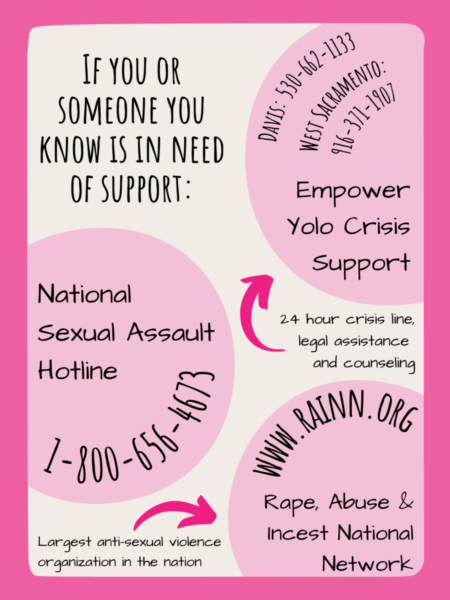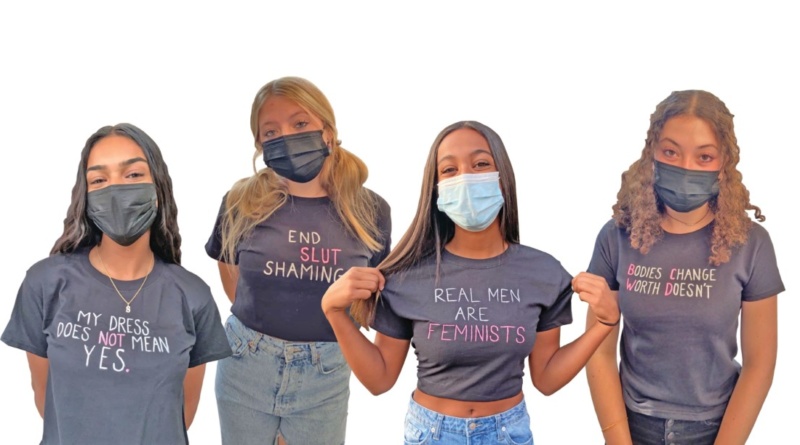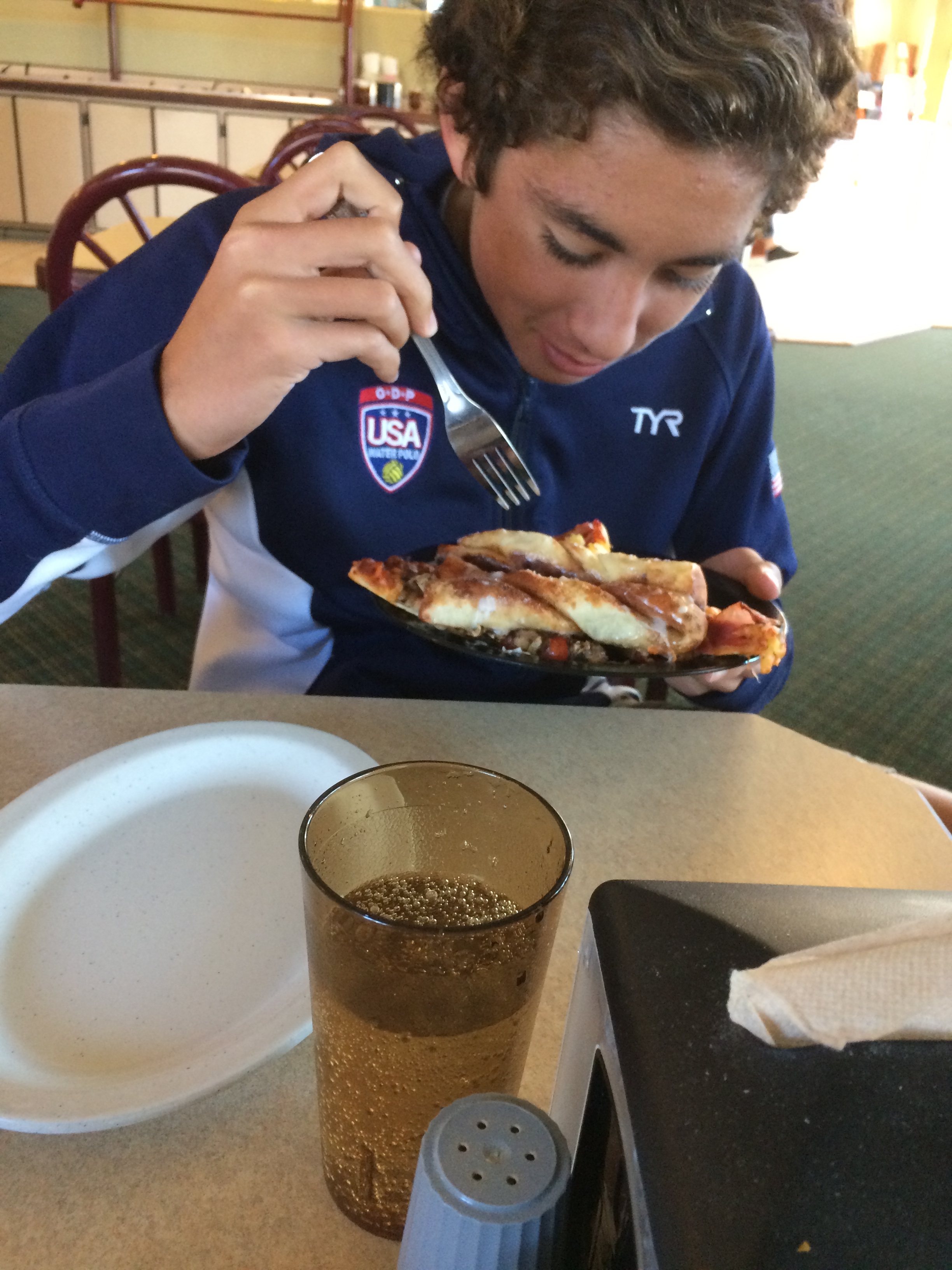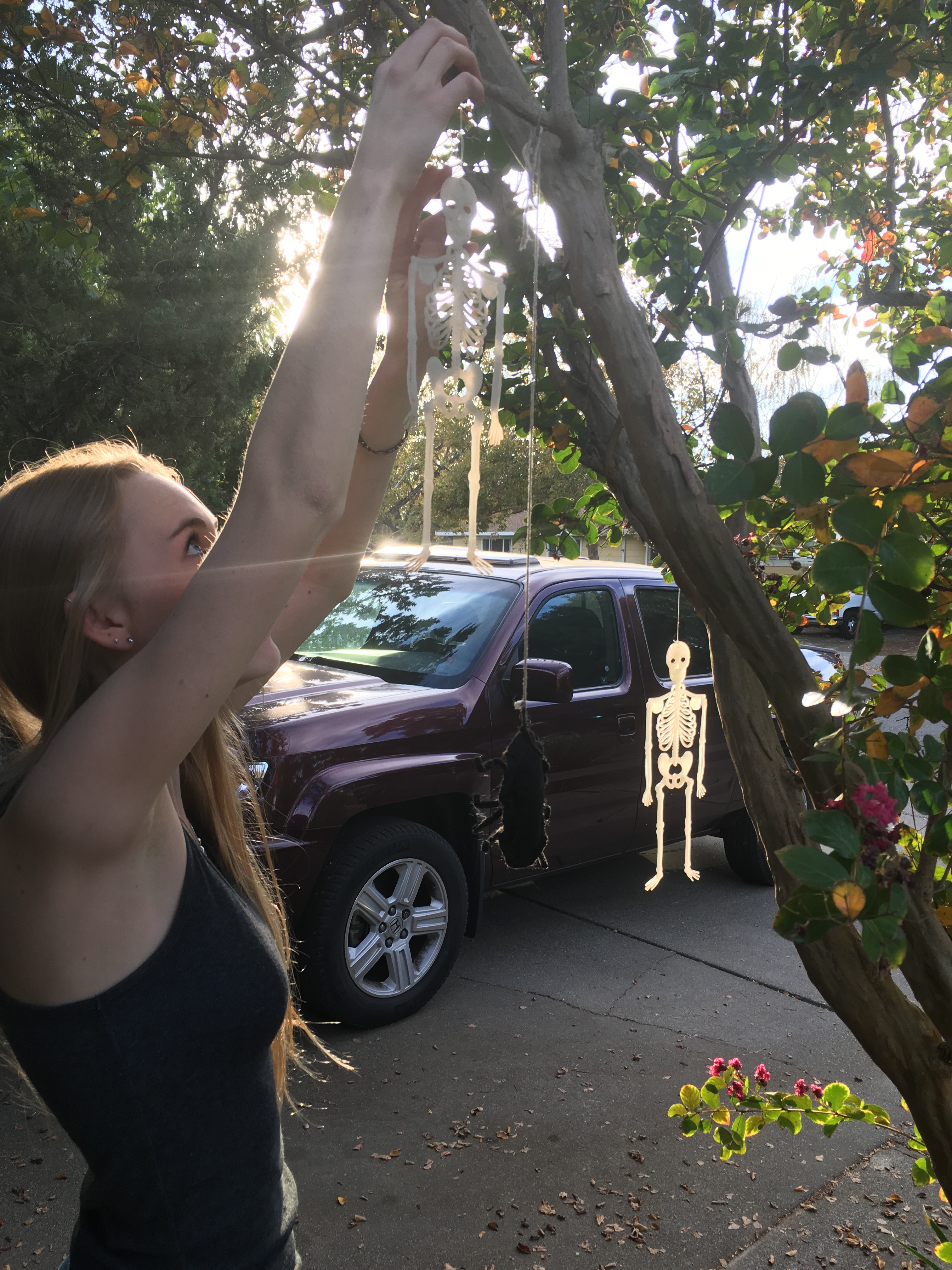Students target sexual assault in T-shirt campaign
PHOTO: Junior Somya Singh, junior Brooklyn Bolnik, sophomore Sabrina Hazel and junior Mayah Moore sport their customized T-shirts.
By Shira Kalish,
BlueDevilHUB.com Staff-
“End victim blaming.” “Real men ask for consent.” “My dress does not mean yes.”
Since Tuesday, Sept. 7, a growing number of Davis High students have been wearing shirts to school with messages like these in pink and white letters.
The shirts were created by Davis High juniors Halla Sorensen and Mollie Dyer and Davis School for Independent Study junior Audrey Paschal, who started the project in order to raise awareness about sexual assault in the Davis community and de-stigmatize the topic.
“We went over to Michaels and got shirts and fabric paint, and we started looking up quotes and stuff of what we wanted to say. Some were from our own brains, things we’ve heard before,” Sorensen said. A few days later, she and Dyer wore shirts with some of the quotes they came up with to school.
Sorensen said that at first, other students were unsure of what to make of it. But after they posted pictures of themselves wearing the shirts that afternoon on Instagram, many other students reposted the photos on their own Instagram stories. Some asked if they could have a shirt, so they made more and gave them out.
When Sorensen, Dyer and others came to school the next day sporting more of the customized shirts, they received praise and support from many of their peers.

“It was refreshing and impressive to see people bringing attention to problems such as sexual harassment, assault, abuse, … and toxic masculinity in a creative way. I think the shirts are a great way to spread short messages and show support,” senior Zhuqing Liu said.
Sophomore Juna Brothers said the shirts could help launch discussions on uncomfortable but very necessary topics.
“What these people are doing is really important and necessary, especially in our high school’s current climate,” she said. “I feel like the topic of sexual assault is kind of brushed aside and never fully addressed inside or outside of the classroom, and the statements on their shirts are a powerful message to display to students and staff, and start the difficult conversations that are necessary for a safer environment.”
“The shirts are an easy way for everyone to see what many women have to deal with throughout their lives and keep inside,” junior Somya Singh said.
By the end of the week, Paschal, Sorensen and Dyer had given away more than a dozen shirts to students.
One of their goals is to help students feel more comfortable talking about sexual assault.
“It’s hard to talk about within the DHS community,” Sorensen said. “I feel like a lot of people just don’t know how to talk about it because it’s so stigmatized. Adults don’t want to talk about it with teenagers.”
“Nobody’s gonna know how to deal with it if we don’t talk about it,” Dyer said.
Sorensen said that she has noticed that many male students are especially hesitant to talk about sexual assault, and avoid the subject out of fear of saying something wrong or making people uncomfortable. In reality, she said, it is helpful for people of any gender to have conversations about sexual assault because people of any gender can be victims.
“I’ve talked to several boys where they don’t even realize that they’ve been sexually assaulted or sexually harassed,” Dyer said. “I don’t think people know what classifies as sexual assault.”
DHS head counselor Catherine Pereira, though, said the school does emphasize educating students about sexual assault, which is vital to sexual assault prevention.
“For prevention, DHS has had several assemblies regarding consent and sexual assaults, with guest speakers, movies, panels, etc.,” Pereira said in an email.
Singh agreed that school employees have made it clear they are available to help students.
“I feel like teachers and staff take it very seriously and they try their hardest to make us feel safe. If we were to ever need to talk to someone about a specific problem, we could,” Singh said.

Catherine LeBlanc, a licensed therapist in Davis, said schools do need to be proactive on the topic.
“I think it would be terrific if schools could take on the responsibility of educating teens and even younger children— with age-appropriate materials, of course—about this issue,” LeBlanc said.
LeBlanc, who in the past has treated Davis high school students who were sexually assaulted, said psychotherapy can be “very helpful.” She currently focuses her practice on working with adults who have survived childhood trauma, including sexual assault.
“Unfortuately, sexual assault occurs in our community,” LeBlanc said. “I don’t think anyone should have to carry the burden of self-blame or feel like they have to be alone in their pain.”
LeBlanc said that for most of her clients, the aftermath of the assault can feel worse than the assault itself. She said that teenagers who are survivers of sexual assault should reach out to a trusted adult to get the support they need.
Sorensen and Dyer are in the process of creating a website to sell their shirts. They will be priced at around $10 each, and proceeds will be donated to local or California non-profits that specialize in helping survivors of sexual assault.
As Sorensen wrote in an Instagram caption, “This is only the start. I am done with people trying to control and take advantage of other people’s bodies … It is time to speak out and let your voice be heard. Mollie and I are not planning on slowing down.”




